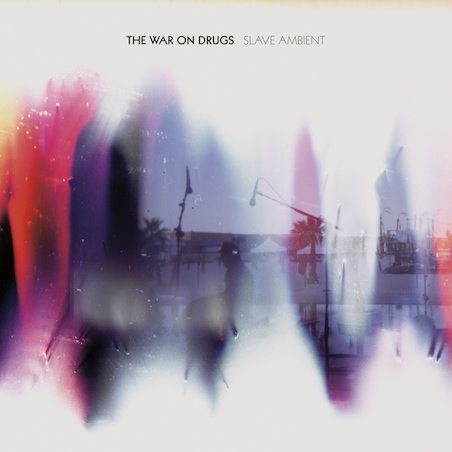It’s not often that a band can wear their influences so clearly on their sleeve but receive much more credit for it than criticism. This was an achievement The War On Drugs pulled off with their debut album Wagonwheel Blues, with Dylan, Springsteen and your-shoegaze-band-of-choice getting mentioned in every review, but the fact that they took the best of all these elements and put them together into a potent concoction meant that they were critical darlings. On the other side of the coin, music listeners who are averse to the mere mention of any of these acts will have passed over it. Three years on not much has changed. Last year’s Future Weather EP showed that The War on Drugs were still persisting with their continual drive that their music seems to be made for, and now we have Slave Ambient which takes us further down the road, and possibly to the most interesting sites seen yet.
Although Kurt Vile is now no longer a part of The War on Drugs, it’s unsurprising that his fingerprints remain on The War on Drugs’ music. The opening suite of four songs are fit to occupy the jukebox of the same smokey outhouse where Smoke Ring For My Halo might be commonly heard. This is the kind of place where a obvious hook in a song is not welcome; meandering vocals and rich guitar tone make a hit. The driving drums are the perfect bed for Adam Granduciel’s rhythmic and emphatic vocal style, and it’s obvious from the first listen that there is certain meaning behind his lyrics, though it would take some careful studying to figure out the full messages or stories. Fortunately with the washes of guitars creating something so subtly pleasant to listen to, revisiting these songs to try to figure it out is a pleasant experience.
The opening quartet of songs is something of a mislead with regards to the album as a whole, since for the following eight songs you won’t find any two full songs back to back. Wagonwheel Blues was divided by two carefully-placed instrumentals, but the four interludes found on Slave Ambient don’t divide up the album in a way that makes as much sense. Nevertheless, these tracks do not detract from the album as much as they would if made by a band who didn’t understand so well how to maintain flow. Continuing with the road trip analogy, these songs are like the points where all of a sudden you lose radio signal and you’re left with static (in this case melodious and tuneful static) with ghostly washes of various sounds coming floating over the airwaves, be it saxophone (“The Animator”) or harmonica (“Original Slave”).
These tie in to the songs that make up the latter portion of the album, particularly “Come to the City,” and “It’s Your Destiny” where the drive is not so purposeful as at the start and they seem more like hazy, floating continuations of the interludes. Granduciel’s dense lyrics are still prominent, but are less pertinent, with the pianos and synths making a cascade of audible colours (something akin to the front cover) all over the tracks. It’s easy to let these float by, but to do so is to lose the essence of the album.
One complaint to be made about Slave Ambient are that two of the best tracks, “Brothers” and “Baby Missiles” are almost a year old, since they featured on last year’s Future Weather EP. “Brothers” is reworked to add the haze of distorted guitars that hovers of the whole of the album, which will certainly displease some fans of the original who may feel it obscures the vocals somewhat, but this was a necessity to maintain the flow of Slave Ambient, which is key to its success. To include these songs again, while not satisfying for those that are already more than familiar with them, is a smart move since they deserve to be heard on a more widely recognised format.
Hopefully Slave Ambient will do for The War On Drugs what Smoke Ring For My Halo did for Kurt Vile and place Adam Granduciel as one of the musicians with serious talent and songwriting acumen in modern indie rock. Vile has toured with Thurston Moore out of his success, and while it’s unlikely that The War On Drugs will get to tour with Bob Dylan or Bruce Springsteen, it wouldn’t be a bad idea by any means. Nevertheless Granduciel does plenty of talking on Slave Ambient and I’m sure he’ll do plenty more as The War On Drugs march on, and it’s only a matter of time before his words get heard by a wider and more appreciative audience.


